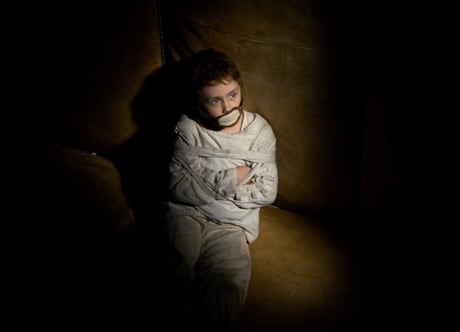Taking place in both present day and the dawn of the Spanish Civil War, this highly allegorical and ineffective horror-thriller of sorts posits the inability to feel physical pain as an overt metaphor.
While initially intriguing in sheer set-up, playing on themes of dread of difference and coldness as a survival response to negative stimuli, an overall lack of plausibility or payoff, exacerbated by childish gratuity and gore, makes this a mostly painful cinematic experience.
It opens in early '30s Catalonia, with a young girl casually burning her arm without reaction. Shortly thereafter, we see a young boy eating his arm. Terrified by this affliction and the dangers it might pose to society — a concept lost in didactics — these children, and others, are taken by the government and dumped in a sanatorium for observation and experimentation.
In the present day, a successful doctor winds up surviving a brutal car accident, only to learn that he has lymphoma and requires a bone marrow transplant from a family member in order to survive. The problem is that his parents aren't his birth parents, which inevitably sends him down a road of personal exploration, and added allegory, to discover just what it he was born from.
While the present day drama unfolds predictably and without an ounce of dramatic tension, the sequences within the sanatorium, with various nurses and doctors responding differently to the afflicted children, hold narrative intrigue. One boy in particular refuses to respond to their emotional training tactics, passive-aggressively mutilating his body while adversely finding power and motivation in the negative stimuli he receives in response.
But as close-ups of torn off fingernails and mutilated flesh compound and the plausibility of unfolding events becomes increasingly ludicrous, it's nearly impossible to care about his outcome by the time the Communist militia show up, spearheading the wartime allegory of destroying innocence that acts as a trajectory.
A knowledge of the Spanish Civil War might help audience members understand just what it is that director Juan Carlos Medina is trying to say, but it's unlikely that it will make anyone care.
(Elle Driver)While initially intriguing in sheer set-up, playing on themes of dread of difference and coldness as a survival response to negative stimuli, an overall lack of plausibility or payoff, exacerbated by childish gratuity and gore, makes this a mostly painful cinematic experience.
It opens in early '30s Catalonia, with a young girl casually burning her arm without reaction. Shortly thereafter, we see a young boy eating his arm. Terrified by this affliction and the dangers it might pose to society — a concept lost in didactics — these children, and others, are taken by the government and dumped in a sanatorium for observation and experimentation.
In the present day, a successful doctor winds up surviving a brutal car accident, only to learn that he has lymphoma and requires a bone marrow transplant from a family member in order to survive. The problem is that his parents aren't his birth parents, which inevitably sends him down a road of personal exploration, and added allegory, to discover just what it he was born from.
While the present day drama unfolds predictably and without an ounce of dramatic tension, the sequences within the sanatorium, with various nurses and doctors responding differently to the afflicted children, hold narrative intrigue. One boy in particular refuses to respond to their emotional training tactics, passive-aggressively mutilating his body while adversely finding power and motivation in the negative stimuli he receives in response.
But as close-ups of torn off fingernails and mutilated flesh compound and the plausibility of unfolding events becomes increasingly ludicrous, it's nearly impossible to care about his outcome by the time the Communist militia show up, spearheading the wartime allegory of destroying innocence that acts as a trajectory.
A knowledge of the Spanish Civil War might help audience members understand just what it is that director Juan Carlos Medina is trying to say, but it's unlikely that it will make anyone care.
